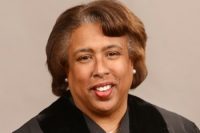
The granddaughter of sharecroppers and the daughter of Thelma Dean Martin and Fred Rice, Chicago’s first African-American Police Superintendent, Judge Judith Rice (’88) was the first female Commissioner of two of Chicago’s biggest government agencies and served as Senior Vice President of BMO Harris Bank before she was elected Judge of Cook County’s 7th Subcircuit Court. John Marshall recently caught up with Judge Rice to retrace her remarkable public and private career, her passion for Chicago, and her secret love of motorcycles.
JMLS: What was your path to law school? When and how did you know you wanted to be a lawyer? Did your experience working in the Cook County State’s Attorney’s Office inform this decision?
Judge Rice: It seems that the universe was guiding me toward law school, or at least a career in law, even before I knew that I was really interested. I was studying corporate communications as an undergraduate and earning a general liberal arts education, but I hadn’t been thinking about a long-term career in serious terms. Nearing graduation I began looking for part-time work and spotted a notice in the student union for a law clerk position at a small labor law firm downtown. I went for the interview and the job included duties such as filing, maintaining documents in the law library, and delivering documents. The office was in such disarray I was hired on the spot! During that year, I had the opportunity to interface with the attorneys at the firm and learn about their careers and how they got through law school. When it was quiet, I would often read through labor law cases, and my curiosity was piqued. While setting up the firm’s conference rooms for meetings, I often had a chance to meet clients as they came to meet with the attorneys. It was as if a new world had opened up to me.
Soon after graduation, I was hired by the Cook County State’s Attorney’s Office as a Victim Witness Assistant. It was a new position created by the State’s Attorney to help victims of a violent crime navigate the court process. I firmly believe my time as a law clerk helped me to obtain the position. As a Victim Witness Assistant, my duties included informing crime victims of all court dates, obtaining transportation for them to come to court, answering all questions about the court process, interfacing with the prosecutors, and in some cases, accompanying them to court on days when their testimony was needed. As I sat and listened to the hearings and trials, I began to believe that I could represent someone in court, as well. I was learning the process and procedure and language necessary to do so.
As a young African-American woman from the South Side of Chicago, I never dreamed of going to law school. Interestingly, one of my friends, whose father was a lawyer, was applying to JMLS so she could go into private practice with him. She taught me everything I needed to know about studying for and taking the LSAT and applying to law school. I can’t fully express the pride and joy that I felt along with my family at getting the acceptance letter from JMLS. I was law school bound!
JMLS: Do you have a favorite memory of law school?
Judge Rice: My fondest memory of law school was of actually being in class; I loved attending classes at JMLS. I really liked the energy of all of the students gathering in the hallways before class to chat and of the dialogue and discussions we had during class. I remember sitting in class in the old building and just marveling at the tall windows and the beautiful wood desks and chairs. The mere physical presence of the building was so powerful. I feel so fortunate to have had some of the best law professors in the country, many of whom I still talk with today. I looked forward to the Socratic Method that professors used to make us really think and analyze fact patterns—constantly changing one or two small facts in their case scenario to see if that influenced the way we analyzed the outcome of a case. That fostered class discussion and helped me get to know my classmates much better.
I also fondly remember that after class many of us would form study groups to try to keep up with case law and prepare for finals. The time we spent together in the library or going to one another’s homes to study with pizza and snacks built such a camaraderie and friendship between us.
JMLS: Can you tell us one thing that your John Marshall classmates might be surprised to learn about you?
Judge Rice: I think that most people are surprised to learn that I love motorcycles! About 10 years ago, I took a couple of riding classes and obtained my license. I never pursued riding, because my friends and family convinced me that I was already a distracted driver and would probably be a danger to myself and others on a bike. To this day, however, I dream of owning a new Harley Davidson.
JMLS: You’ve had such a dynamic career in both the public and private sectors. You served as Treasurer for the City of Chicago under Mayor Richard Daley. You were the first female Commissioner of both the Chicago Department of Transportation and the Chicago Department of Water. You worked as Director of the Department of Revenue and practiced law as assistant corporation counsel. You were also Vice President, and later Senior Vice President, of BMO Harris Bank, before becoming Judge of Cook County, 7th Subcircuit. What achievement are you most proud of in your professional career?
Judge Rice: There is not one job, position, or role that is more special to me than another. They were all opportunities that came to me at very important times in my life. In each new position, I was able to learn something new, develop additional skills, grow, and hopefully contribute something to the community. And none of these positions were achieved alone. I had many mentors, coaches, and friends helping me along the way in my professional career.
I also strongly believe that we have to teach young women not to be afraid of new challenges and responsibilities. There were times when I doubted my skills and ability to learn new tasks. I had to learn to dig deep and develop the self-confidence to get out of my comfort zone and to accept new roles. When I was appointed the first woman Commissioner of two male-dominated departments (Water and Transportation), many of the men wanted to protect me from having to go to construction sites or accident sites. Everyone quickly learned that I wasn’t going to be sidelined; I was going to put on my boots and hardhat and get out of the office and into the field.
I sought out the position in a major bank to gain exposure and experience in the private sector. My experience as City Treasurer provided me with the knowledge of the City’s cash flows and public pension fund investment strategies. I was able to parlay that experience into the banking sector and develop new skills in business development, community reinvestment, and compliance.
In short, I believe that each role built upon the last and prepared me for the next. I consider myself very fortunate to have had the opportunity to have had several careers in one lifetime.
JMLS: You left the private sector to run for judge in 2014. What compelled you to return to public service and pursue the bench?
Judge Rice: I believe that once you have public service in your blood, it is very difficult to leave it completely behind. Moreover, becoming a judge is considered the pinnacle for most attorneys in their career. Even though I had a great career in banking and finance, I began to feel disconnected from serving my community. I could see that the courts were playing an important role in many areas affecting our communities, such as housing, poverty law, juvenile justice, LGBT rights, and women’s rights. I wanted to be able to have a personal impact in some of these areas. Additionally, I believe that having individuals making decisions on cases in the courtroom that represent these various communities is extremely important.
As a lifelong Chicagoan, I felt that I had unique experience in the government, legal, and business areas that would help me make informed and compassionate decisions in cases that would come before me. I know wholeheartedly that people want their day in court and deserve to be heard. I knew that it would be an honor for me to be able to make well-reasoned decisions within the law that would help achieve the fairest and most just result for litigants.
JMLS: You have worked with some of the most prominent figures in Chicago business and politics. What is the best piece of professional advice you have received?
Judge Rice: The best professional advice that I have received is to treat everyone fairly, with dignity and respect. The professional worlds of law and business are actually very small, and you are likely to meet the same people in many different roles throughout your career. Your professional reputation will precede you. There have been so many occasions when people I have known from school or previous jobs have been there to help me because they believed in me or we had positive interactions in the past. If you are known as someone who treats others unfairly, not many people are going to come to your assistance. And by everyone, I mean everyone—not just who you perceive as having positions of power. I have often had more help from office administrative assistants than anyone else.
JMLS: You are a lifelong Chicagoan. Your mother was a Chicago Public Schools teacher. Your father, Fred Rice, was the first African-American Police Superintendent of Chicago. You worked for the City from 1989-2007, served on the boards of the March of Dimes, UCAN, the Chicago Public Library, Neighborhood Housing Services, and the Civic Federation. You have also been active in the LGBT community. What is special about Chicago, and how does JMLS play a role in the community?
Judge Rice: Chicago is a great city, full of good hard-working people. I believe the people here have strong Midwestern values: that close friends and family are as important as making a decent living and giving back to the community. We are a city of immigrants from all over the world. This is reflected in our neighborhoods, which are rich in diversity of housing, restaurants, art and cultural amenities, and non-profit programs. The people of Chicago are strong—we brave some of the toughest winters in the world. We have strong and involved non-profit organizations that are dedicated to improving the lives of Chicago residents. We have some of the most outspoken and well-known political figures in the world. I don’t believe that it is an accident that so many U.S. presidents have been from this state and region.
But most importantly, as Chicagoans we value education. We are always working to improve our public school system and our City Colleges. We have some of the most noteworthy educational institutions in the country here in the city. In my opinion, JMLS plays a huge role in providing legal education to the community. Many John Marshall students are like me—working professionals who are the first in their family to go to law school. Some are individuals with family members who graduated from JMLS, who will be joining family members in private practice. Many JMLS students are police officers or law enforcement professionals moving toward a second career. I have found that most JMLS students tend to be Chicagoans with deep roots in the community, who want to stay here to use their legal education in some way to support the community. I am always amazed when I look at the number of elected officials, as well as members of the judiciary, who are JMLS graduates.
JMLS: Will you share with us some of your hobbies or leisure activities?
Judge Rice: I love to read in my spare time. I read many different magazines, particularly those that are geared to news and politics. I particularly love reading biographies about, or by, political figures, as I am fascinated by history and government. I also spend quite a bit of time in the southwest. I own a second home in Santa Fe, New Mexico, and I collect Southwest Indian pottery. I have collected quite a few Santa Clara black pots, as well as Acoma pots. I generally attend the Native American Arts Festival each summer in August to add to my collection.


